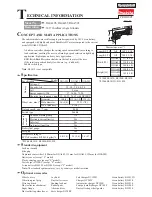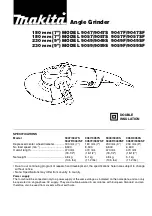
GB
- 17 -
g) If vacuuming devices and draining devices
can be
fi
tted, make sure that these are cor-
rectly attached and correctly used. The use
of a dust extraction system can reduce the
danger posed by dust.
4. Usage and treatment of the electric tool
a) Do not overload the appliance. Use the cor-
rect tool for your work. You will be able to work
better and more safely within the given perfor-
mance boundaries.
b) Do not use an electric tool with a defective
switch. An electric tool that cannot be swit-
ched on or o
ff
is dangerous and must be
repaired.
c) Pull the plug out of the socket and/or remove
the battery before making any adjustments to
the appliance, changing accessories or put
the appliance down. This safety measure pre-
vents starting the electric tool unintentionally.
d) Keep unused electric tools out of the reach
of children. Do not allow people who are not
familiar with the appliance or who have not
read these instructions to use the appliance.
Electric tools are dangerous if they are used
by inexperienced people.
e) Clean your electric tool carefully. Check whe-
ther moving parts are functioning properly
and not jamming, whether parts are broken or
damaged enough that the functioning of this
electric tool is a
ff
ected. Have damaged parts
repaired before using the appliance. Many
accidents are caused by badly maintained
electric tools.
f) Keep your cutting tools sharp and clean.
Carefully maintained cutting tools with sharp
cutting edges will jam less and are easier to
control.
g) Make sure to use electric tools, accessories,
attachments, etc. in accordance with these
instructions. Take the conditions in your work
area and the job in hand into account. Using
electric tools for any purpose other than the
one for which they are intended can lead to
dangerous situations.
5. Service
a) Have your electric tool repaired only by
trained personnel using only genuine spare
parts. This will ensure that your electric tool
remains safe to use.
Safety Information for all Applications
a) This electric tool is designed for use as a grin-
der/sander and cutting-o
ff
machine. Obey all
the safety instructions, general instructions,
illustrations and data supplied with the tool. If
you fail to obey the following instructions, you
may su
ff
er an electric shock,
fi
re and/or seri-
ous injuries.
b) This electric tool is not designed for sanding,
working with wire brushes or polishing. Use
of the electric tool in ways it was not intended
could lead to dangerous situations and inju-
ries.
c) Do not use any accessories which have not
been designed and recommended by the
manufacturer speci
fi
cally for this electric tool.
Just because you can attach an accessory to
your electric tool, this does not guarantee that
you can use it safely.
d) The maximum speed of the plug-in tool must
be at least as high as the maximum speed
speci
fi
ed on the electric tool. Accessories
which rotate faster than the maximum speed
may break and be catapulted out of the tool.
e) The external diameter and thickness of the
plug-in tool must comply with the dimension
speci
fi
cations of your electric tool. Plug-in
tools of the wrong size cannot be adequately
screened or checked.
f) Grinding
wheels,
fl
anges, grinding disks or
other accessories must
fi
t precisely on the
grinding spindle of your electric tool. Plug-in
tools which do not
fi
t exactly on to the grin-
ding spindle of the electric tool will rotate
irregularly, vibrate a great deal and may result
in you losing control.
g) Do not use damaged plug-in tools. Before
use, check plug-in tools such as grinding/san-
ding wheels for splintering and cracks, grin-
ding/sanding disks for cracks, wear or heavy
wear, and wire brushes for loose or broken
wires. If the electric tool or the plug-in tool is
dropped, check whether it is damaged or use
an undamaged plug-in tool. When you have
checked and
fi
tted the plug-in tool, make sure
that you and other persons in the vicinity are
not on a level with the rotating plug-in tool and
allow the electric tool to run for one minute at
maximum speed. Damaged plug-in tools will
generally break during this test time.
h) Wear personal protection equipment. Use
face guards, eye protection or goggles de-
pending on the application. If reasonable,
wear a dust mask, ear protection, safety
gloves or special aprons to keep small grin-
Anl_SA_TC_AG_850_SPK8.indb 17
Anl_SA_TC_AG_850_SPK8.indb 17
17.10.2017 09:03:01
17.10.2017 09:03:01
















































